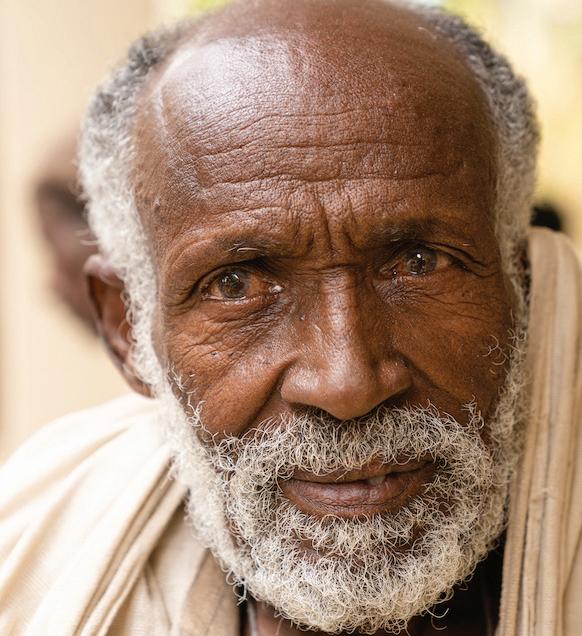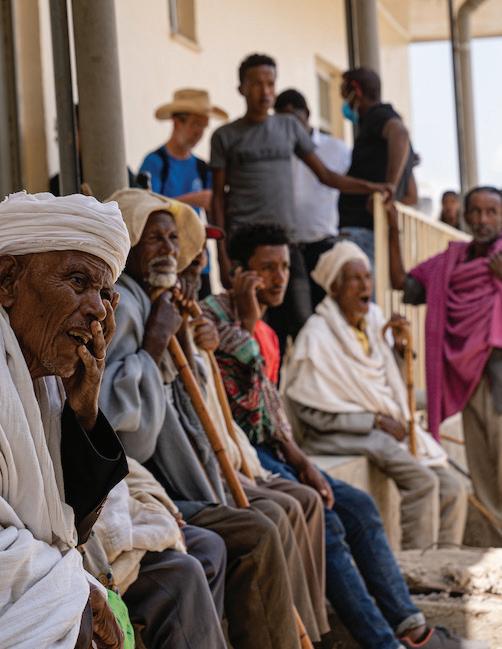
7 minute read
Operation Ethiopia Helps Thousands See Clearly
CATARACTS ARE THE LEADING CAUSE OF PREVENTABLE BLINDNESS IN ETHIOPIA
This past August, Dr. Morris Hartstein, his wife Elisa Minsk Hartstein, their son Jonah, and six other volunteers were preparing for a trip to Ethiopia—their third in 2022. “Next year we have four medical missions planned,” Morris said.
Advertisement
Morris is an Ophthalmologist who moved to Israel with his family in 2004 and was prepping for a hectic week. Between August 28 and September 2, he and his team (including an eye surgeon and three EMTs) would collectively be operating on 15 patients needing complex oculoplastic surgery, running mobile eye clinics in rural villages, overseeing a cataract campaign funded by their organization where 291 patients would receive sight-restoring cataract surgery, and running first-aid training for local medical staff. Morris and Elisa Hartstein founded Operation Ethiopia to help bring eye care to a population badly in need of medical intervention.
In 2014, the Hartstein children were between the ages of 11 and 16. They and their parents wanted to do something meaningful with their summer, rather than take a typical family vacation. They decided to volunteer at the Jewish compound in Gondar, Ethiopia. About 85% of the Jewish population in Ethiopia lives in Gondar, in conditions that were shocking to the Hartsteins.
“The families live in mud huts with no running water, no kitchens, no bathrooms, and the kids were visibly malnourished,” Elisa said. The family spent a week in Ethiopia, running activities for hundreds of children in the village and volunteering at the Mother Teresa orphanage in the city of Addis Abba.

Ori Aviram
Word got out that Morris was an eye doctor. “Most of the people in the Jewish community in Gondar had never been seen by a doctor before,” he said—let alone an eye doctor. Morris immediately recognized that many in the village suffered from conditions that could be quickly and easily treated in the United States—like cataracts. Most cases of cataracts are caught and treated early here, before reaching advanced stages. But in Ethiopia, lack of access to medical care, and lack of funds to pay for surgery, means that people eventually become blind.
Morris did what he could for the patients he examined that week, but his whole family knew they had to do more.
For the Hartsteins, helping others really is a family affair. Elisa was born a second-generation Jewish Atlantan; she is a graduate of the Hebrew Academy and Yeshiva high school (now known collectively as the Atlanta Jewish Academy). Her parents, Betty and Malcolm Minsk, were stalwart supporters of Federation and other local Jewish organizations. She says that her family’s dedication to helping their community made a major impact on her life, and the work she and Morris do.
The Hartsteins returned home from Gondar and set to work—they purchased medications and eyeglasses using their own money. A year after their first trip to Ethiopia, they returned with 12 suitcases of supplies and set up their first mobile eye triage clinic in the Jewish compound of Gondar.
Over the next few years, the Hartsteins expanded their services beyond the Jewish community to nearby villages. They partnered with Struggle to Save Ethiopian Jewry (SSEJ) to start a feeding program for malnourished children in the Jewish community. They connected with the University of Gondar Hospital and began working with their eye department. Morris started a doctor training program to bring Ethiopian ophthalmologists to his hospital in Israel for advanced specialized training.
Morris and Elisa officially incorporated Operation Ethiopia as a non-profit organization in Israel in June of this year, enabling them to bring more help to the people of Ethiopia on a larger scale.
In 2022, the American Academy of Ophthalmology awarded Morris the Outstanding Humanitarian Service Award, and in Israel he was awarded the Sylvan Adams Nefesh B’Nefesh Bonei Zion Prize for Global Impact.
Since 2014, Morris has volunteered his time to personally examine and treat nearly 7,000 patients through mobile eye clinics, performed complex oculoplastic surgeries in Gondar and in Addis Abba, and trained Ethiopian eye care professionals.

Ori Aviram
HOW DO THE CATARACT CAMPAIGNS WORK?
During a cataract campaign a high volume of surgeries are performed in a short time in an area where there is otherwise little to no access to surgery. Operation Ethiopia’s August trip was focused in the area around Gondar.
• August 3: Screenings begin in the surrounding villages
• News about the screenings circulates throughout the region through word-of-mouth, radio, and notices at local health clinics
• Those with the densest cataracts are assigned a day to come during the campaign
• August 28: Dr. Hartstein and Operation Ethiopia arrive
• September 2: In 6 days, Operation Ethiopia and their local team carry out the campaign, performing 291 sight-restoring surgeries
Patients who were legally blind before the surgery achieve significant visual improvement, with many reaching 20/20 vision.
Hartstein and his team of volunteers have distributed thousands of units of eye medications and eyeglasses and led three cataract campaigns. Thanks to these efforts, 1,000 people have regained their eyesight.
One of Operation Ethiopia’s focuses is on training eyecare specialists; building an infrastructure of diverse eyecare professionals is crucial to their mission. So far, Operation Ethiopia has brought 18 Ethiopian eye doctors to Israel for advanced training. Morris is a specialist in oculoplastic surgery. One Ethiopian doctor has trained with him for a year; this one doctor has nearly 18 million people in his jurisdiction. Ethiopia has a population of nearly 110 million people, and yet there are only about 200 eye doctors in the entire country.
Morris marvels at the ingenuity of the doctors he has worked with in Gondar. He says “Western doctors tend to rely on expensive machinery for things like cataract surgeries, because it’s what they’re trained on, and what they’re used to. The Ethiopian doctors can do it without expensive equipment, and sometimes even without needing stitches.”
Besides cataracts, Ethiopia is #1 in the world for trachoma. If left untreated, this infection leads to scarring of the eyelids and corneas, and eventually blindness. It is treated with a surgery called TT, which Morris specializes in. He trains doctors in this surgery, as well as other advanced techniques.
Operation Ethiopia takes volunteers with them on their trips, and Morris says, “You don’t need a medical background to volunteer.” In fact, some of their first volunteers were the friends of their teenage kids. They would help people check in, move supplies, and perform other tasks around the clinics.
Elisa says “the people we treat are the poorest of the poor and have no access to eye doctors or eye care. Even the relatively ‘small’ amount of money that these exams and procedures cost is onerous.” She urges people who want to help to visit operationethiopia.com and donate—she says both money and services are needed. Elisa says, “This project started out in the Jewish community and that is its focus, but ‘tikkun olam,’ means it is vital to help everyone, including people in non-Jewish villages. We want to make life better for anyone who needs our help.”
To donate to Operation Ethiopia, click here.




